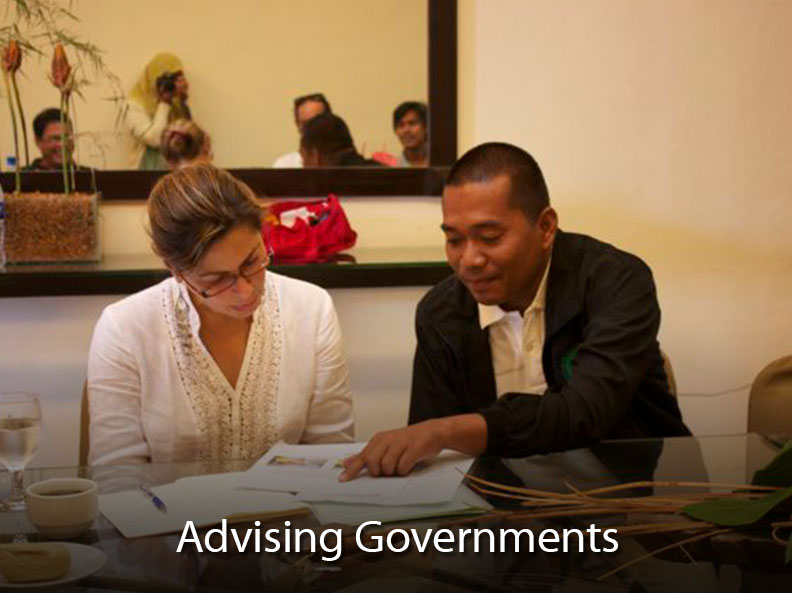
by Cynthia Petrigh | May 17, 2017
At Beyond peace, we document, research, observe and share findings and recommendations on best practice in upholding international norms.
Based on our field work as documented in other sections, and on research (with the Harvard project on Monitoring and Fact-finding; research on the Implementation of WPS agenda in the Arab with SDD/UN Women, etc.), we work with government officials and humanitarian professionals toward improved compliance with international norms and for non-violent resolutions.
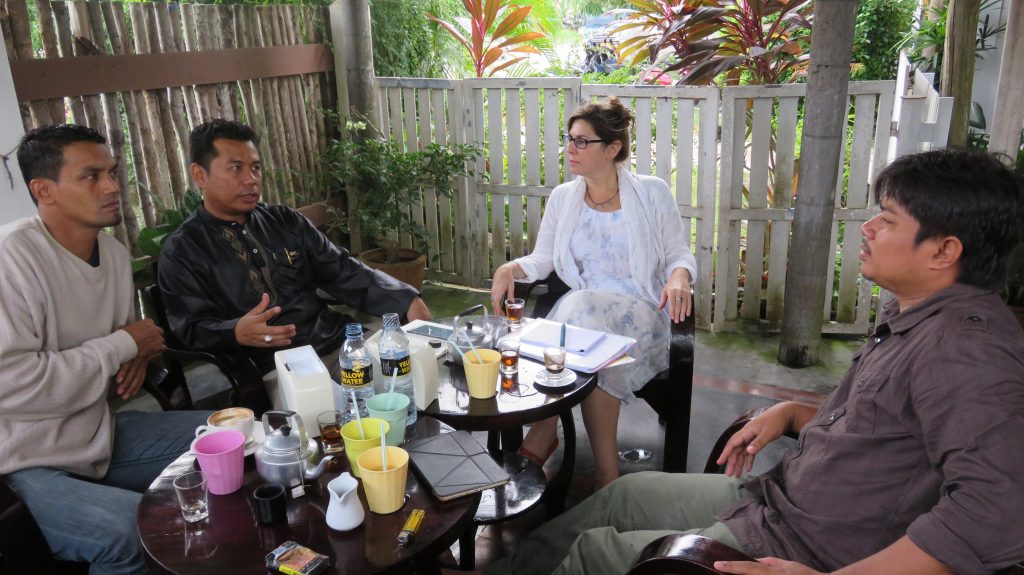
We work with civil society in conflict -affected countries and in societies in transition: with Arab women through the Toledo international Centre for Peace (CitPax), with civil society and women’s organisations in Mindanao, in the Balkans with WIIS and the Belgrade Centre for Political Studies, with GPACC and many other networks around the world. (photo: meeting with NGOs in Patani, Thailand, Dec 2016).
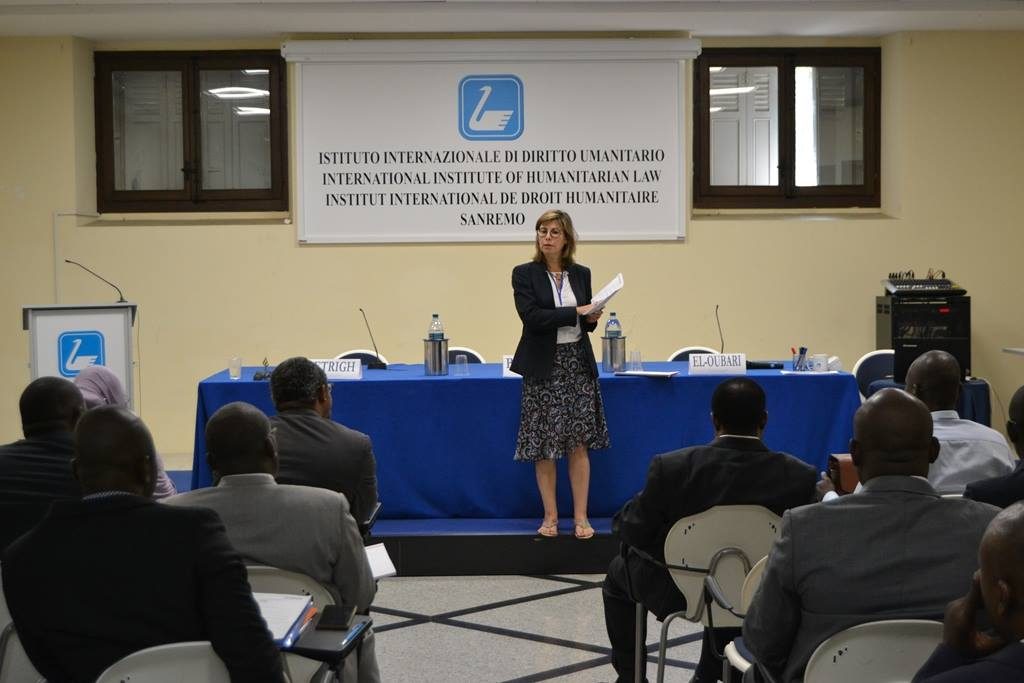
We work with humanitarian professionals: the PHAP project, the ICRC, Institut Bioforce and the International Institute of Humanitarian Law, to contribute to the dissemination of a gendered approach to international norms and to upholding human dignity. (picture San Remo 2017)
To read our latest contribution to the Sanrmeo round-table: http://www.iihl.org/wp-content/uploads/2017/11/Petrigh-2-REV.pdf
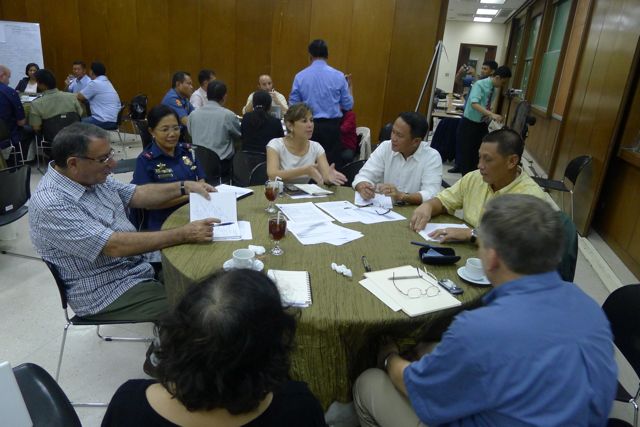
We share with government officials, security sector and civil societies our field observations and our recommendations. (on the picture, Workshop on SSR reform in Manila in 2012, with General Lina Sarmiento PNP, General Ferrer AFP, Father Calvo PAZ).
We work with the UK SU, with the UK PSVI, with the Malaysian peacekeeping centre and the Vietnam peacekeeping department. We regularly provide feedback to the EU institutions.

by Cynthia Petrigh | May 16, 2017
From June 19 to 23, Cynthia Petrigh from Beyond peace is directing the 94th Refugee law Course in French at the International Institute of Humanitarian Law in San remo. 45 Officials from 16 countries debate on refugee status determination procedures, cooperation among States, individual arrivals versus mass influx and security concerns for governments. The course opening featured a testimony by a cultural mediator on the Aquarius. On June 20, participants and organisers celebrated World Refugee Day while UNHCR Filipo Grandi is visiting Niger.
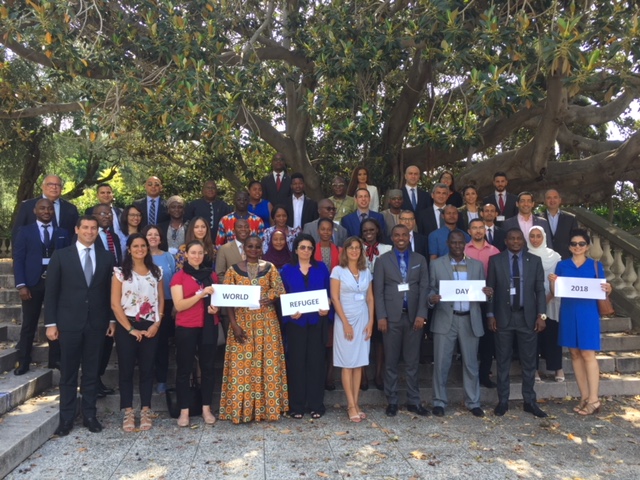
***
Our expertise on asylum and population movements comes from our Founder’s work with asylum and refugees since the beginning of her career in the 1990s.
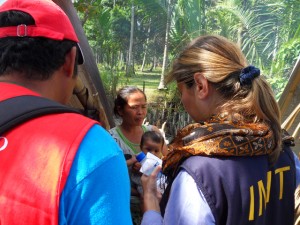
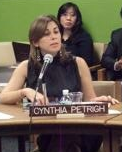
Her positions include:
- Chair elect of the Platform for European Cooperation on Refugees, Asylum-seekers and Migrants (PERCO, 2000)
- Head of Mission for the Danish Refugee Council in Lebanon (2004)
- In 2008, she was appointed Director of the Refugee Law Courses in San Remo, where she occasionally teaches.
- Since 2015, she is a Judge at the French National Court of Appeals for Asylum-Seekers.

by Cynthia Petrigh | May 15, 2017
At beyond peace, we believe policy work is based on field experience and on lessons learnt while working with others. We see it as our role to share with the community of practitioners, and also to share findings, concerns and updates with donors and decision-makers. We are highlighting hereafter some recent events were we were able to disseminate some of our field-based evidence and reflections.
From 26-28 February 2018, we conducted in Brussels a high-level debrief to share our lessons from CAR.
After working for 6 months with the EUTM CAR on improving the FACA behaviour through training on IHL and prevention of sexual violence, we gathered a number of learnings on how EU CSDP missions could be improved. We identified that these missions lack selection standards for their staff; there was no EU pre-deployment training (training is left to nations, as is the case with peacekeepers, with the shortcomings we are familiar with); there was no gender adviser although this is an olbigation in CSDP policy; there were no women in command positions. There was no context analysis conducted, which means that the training is pretty much theoretical and not adapted to the context – with as a result a limited impact. We shared these observations with the EEAS Deputy Secretary General, with the MPCC Chief of Staff, with the NATO Ambassadors and with civil society through the European Peacebuilding Liaison Office (EPLO). We recommend that the MPCC adopts the following reforms for CSDP missions:
- include a gender dimension from the design phase, including through the deployment of a genad
- include training on IHL and PSV as a standard component of EU CSDP training missions
- prepare deploying staff through training on the context, the political and cultural dimension, the legal environment and the gender dimension
- monitor closely these aspects from Brussels level.
Our findings and recommendations will be shared in a workshop titled ‘Gender, Security and Justice in the EU Foreign and Security Policy. Tangible Transformations or Contentious Continuities?’ which will take place on the 18th and 19th of October 2018 in the National University of Ireland, Dublin, Ireland and is organised by the UCD School of Politics and International Relations.
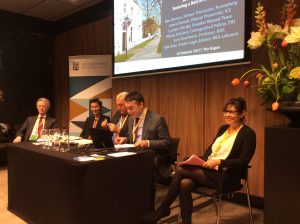
We had the great honor to speak at the Future Force Conference held on 10 February 2017 in The Hague, at the invitation of the Minister of Defense and The Hague Institute for Global Justice (THI). Joining this extraordinary panel of experts (with Former Nuremberg Prosecutor Benjamin Ferencz (by video), ICC Deputy Prosecutor James Stewart, Professor and former Minister of Defense Joris Voorhoeve, Alia Aoun from Lebanon MOFA and Nikola Dimitrov, THI), Beyond peace reminded the Rule of Law session’s room full of expertise about the necessity to uphold the rule of law during war and explore legal, judicial and political ways of doing that.
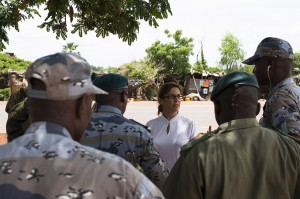
Beyond peace participated in the First Annual Meeting of Frontline Negotiators and Mediators, organised by the newly established Centre of Competence on Humanitarian Negotiation this October in Geneva. At the invitation of the Graduate Institute of International and development Studies and the International Committee of the Red Cross (ICRC) and as part of the set-up to prepare the closed professional event, Beyond peace is also participating in the working Group on the technical, professional and political aspects of negotiating the implementation of humanitarian law and human rights norms on the frontlines of armed conflicts.
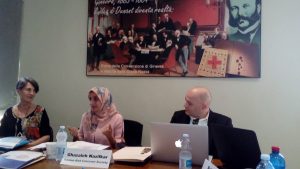
The First workshop for IHL Disseminators was organised in Solferino and Castiglione in June 2016 by the ICRC and the Italian Red Cross within the overall framework of the Solferino Academy, a joint initiative by the Italian Red Cross and the International Federation. The workshop gathered principally Red Cross/Red Crescent Movement components, joined by a few additional expert organisations including Beyond peace, with the objective to map IHL dissemination initiatives and resources, as well as compare and coordinate dissemination strategies. The initiative produced an IHL dissemination table aimed at collecting main initiatives in this field.
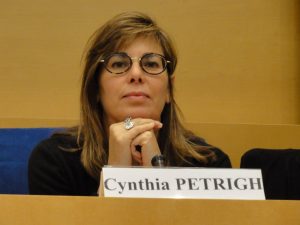
In an unprecedented event in France, the Colloquium Les Femmes dans les Conflits Armés, held at Paris Palais du Luxembourg in April 2016, gathered experts in different areas concerning the roles of women and peace and security questions. Beyond peace Cynthia Petrigh addressed An innovative approach to peace and security issues features in the publication which features in the proceedings published by Démocraties (in French).
***
Beyond peace was invited to speak at the Knowledge Exchange Network Workshop organised by the University of Edinburgh, Newcastle University and UK Ministry of Defense in London on 11 March 2016. Cynthia Petrigh of Beyond peace compared the experience of various armed forces in integrating gender and prevention of sexual violence issues and highlighted the progress achieved by UK armed forces. The Knowledge Exchange Network was launched on this occasion to allow for a continuation of exchange among military, academics and practitioners
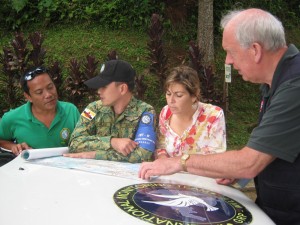
On the 20th of May 2015, The Hague Institute for Global Justice held a closed expert round table on evidence based fact-finding with high-level personalities from the judicial field and experts in investigation missions including Cynthia Petrigh from Beyond peace. The experts discussed – among other topics – the professionalization of fact-finding and the potential for interaction between fact-finding missions and international criminal investigations.














